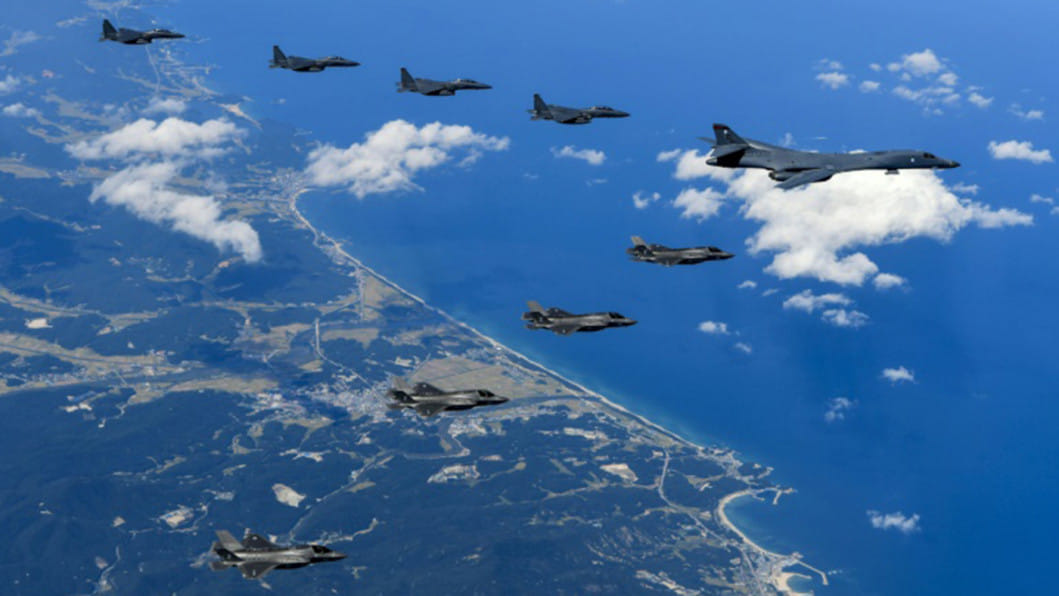US warplanes fly off North Korea coast

US bombers and fighter escorts flew off the coast of North Korea on Saturday in a show of force against its nuclear weapons program, escalating already sky-high tensions.
The hermit state's foreign minister meanwhile derided Donald Trump as "mentally deranged" at the United Nations, while the US president fired back on Twitter with fresh threats.
The latest exchange of bellicose rhetoric comes as international alarm mounts over Pyongyang's weapons ambitions -- including a suggestion this week that the country is considering detonating an H-bomb over the Pacific.
US bombers have carried out similar flights before, as the United States and the international community struggle to rein in North Korea's weapons programs.
But in a new stage for such show-of-force operations, the Pentagon stressed this was the furthest north of the Demilitarized Zone (DMZ) between the two Koreas that any US fighter or bomber has flown off North Korea's coast in this century.
"This mission is a demonstration of US resolve and a clear message that the president has many military options to defeat any threat," Pentagon spokeswoman Dana White said.
"We are prepared to use the full range of military capabilities to defend the US homeland and our allies."
The Air Force B-1B Lancer bombers flown Saturday are based in Guam, and were accompanied by F-15C Eagle fighter escorts from Okinawa, Japan, White said. They flew over international waters off the east coast of North Korea.
There was another reason for concern after an underground rumble near North Korea's nuclear test site. China at first said it suspected an explosion.
But it was later ruled by a nuclear test ban watchdog and other experts to be a shallow 3.5-magnitude earthquake and likely an aftershock from the hermit state's latest nuclear test on September 3.
This week saw a blistering war of words between Kim and Trump, with the US leader using his maiden speech at the United Nations General Assembly to warn that Washington would "totally destroy" the North if America or its allies were threatened.
'Full of megalomania'
Pyongyang, which says it needs nuclear weapons to protect itself against the threat of a US invasion, responded on Friday with a rare personal rebuke from Kim, who called Trump "mentally deranged" and threatened the "highest level of hardline countermeasure in history."
North Korean Foreign Minister Ri Yong-ho took things further. He, too, dismissed Trump as deranged, and said the US president's threats had increased the chances of military confrontation.
Ri told the UN General Assembly in New York that Trump's vow to "totally destroy" his country had made "our rockets' visit to the entire US mainland all the more inevitable."
Describing Trump as a "mentally deranged person full of megalomania," Ri said the US leader who "holds the nuclear button" posed "the gravest threat to international peace and security today."
Trump later responded on Twitter, insulting Kim once more and appearing to threaten both men.
"Just heard Foreign Minister of North Korea speak at U.N. If he echoes thoughts of Little Rocket Man, they won't be around much longer!" he wrote late Saturday night.
Just heard Foreign Minister of North Korea speak at U.N. If he echoes thoughts of Little Rocket Man, they won't be around much longer!
— Donald J. Trump (@realDonaldTrump) September 24, 2017
Washington announced tougher restrictions Friday aimed at curbing North Korea's nuclear and ballistic missile program, building on tough new UN sanctions aimed at choking Pyongyang of cash.
Russia and China have both appealed for an end to the escalating rhetoric between Washington and Pyongyang.
But on the fringes of the UN meeting this week, Ri upped the tensions further, telling reporters Pyongyang might now consider detonating a hydrogen bomb outside its territory.
Monitoring groups estimate that the nuclear test conducted in North Korea earlier this month had a yield of 250 kilotons, which is 16 times the size of the US bomb that destroyed Hiroshima in 1945.

 For all latest news, follow The Daily Star's Google News channel.
For all latest news, follow The Daily Star's Google News channel. 








Comments